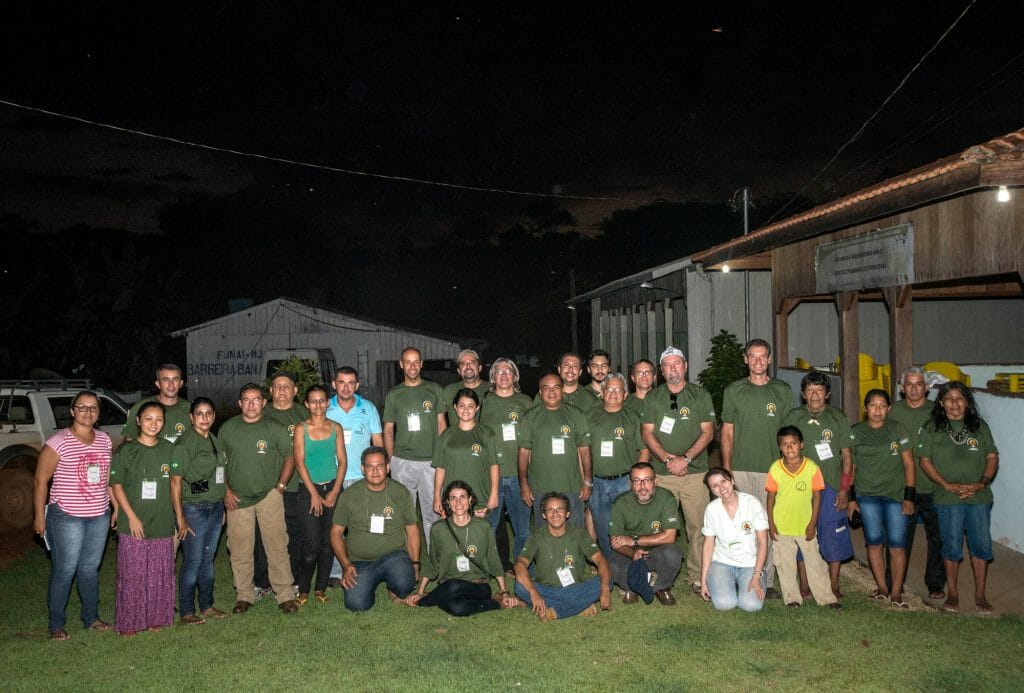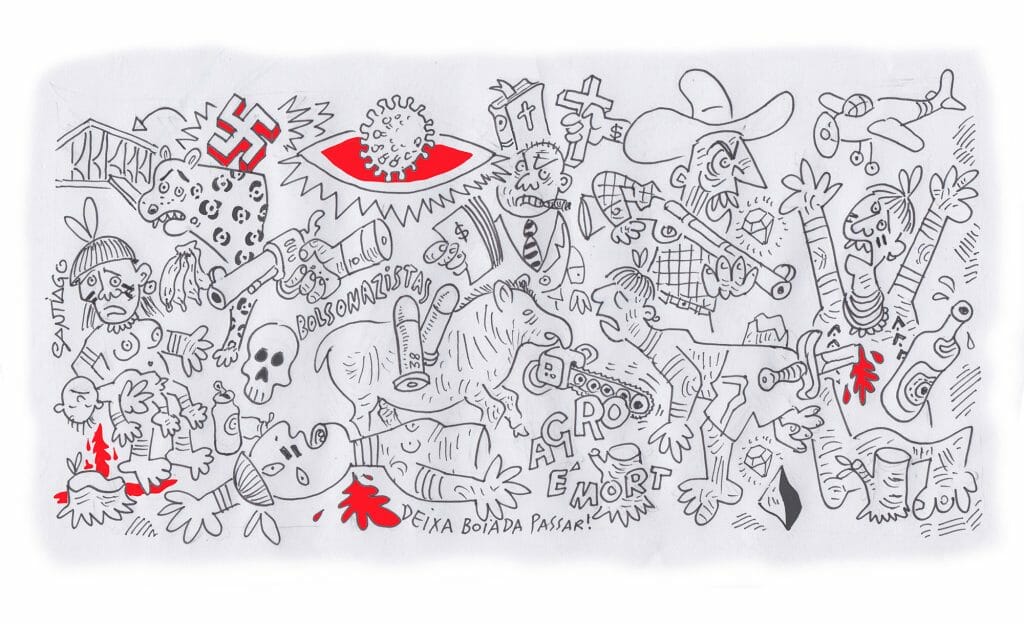Barbara Arisi and Araci Labiak
The Autonomous, or Isolated, living in the interior of the Uru Eu Wau Wau Indigenous Territory, in the state of Rondônia, totally trapped, may have shot the arrow that killed the indigenist Rieli Franciscato. However, many non-indigenous people had certainly shot several arrows or more bureaucratic weapons against all the indigenous people of this country before, and they also help to kill Rieli, a great defender of the Amazon Autonomous Indigenous Peoples.
The current federal government is dedicated to handing over, burning and destroying the Amazon rainforest, the Pantanal, the Cerrado, the Atlantic Rainforest, in short, all the biomes and ecological niches, with their animals, plants, waters and air, along with all the people who live in them.
To this ecocide is added a policy of neglect that denies federal officials like Rieli Franciscato the minimum working conditions to protect the forests and the other Brazilian biomes and their legitimate inhabitants. Rieli, like so many other federal officials of Funai (National Indian Foundation), ICMBio (Chico Mendes Institute for Biodiversity Conservation), Ibama (Brazilian Institute for the Environment and Renewable Natural Resources) are at risk of death every day when carrying out their work for the public service. Neglect of public service which is part of the same ecocide crime committed by the Bolsonaro government.
As coordinator of the Uru Eu Wau Wau Environmental Protection Front [as the FUNAI field fronts are called, which act in the mission of monitoring and protecting peoples in voluntary isolation] in this region of Rondônia, Franciscato had the mission to protect the autonomous (isolated) peoples, and that is what he was doing when he answered the call to go to the Line 6 highway, because a conflict between settlers and the autonomous Indians was happening and soon it could mean a massacre for the Isolated Indians.
Rieli Franciscato was witness to the vulnerability to which the Indians considered by FUNAI as “isolated” are exposed. In the Vale do Javari Indigenous Territory (Amazonas), Rieli was the one who obtained the testimonies of the survivors of the Korubo people who had suffered an attack from river dwellers of the neighbouring community of Ladario.
The Korubo had (and some still have) under their skin pieces of lead from the bullets fired at them. Franciscato is the author of a report (note 1) by FUNAI where this massacre was recorded as a chapter of the (sad) history of the Brazilian Amazon. He was very experienced in the service of protecting the autonomous peoples. In the Vale do Javari Indigenous Territory, the largest concentration of indigenous peoples living autonomously in the world, Franciscato led expeditions to the regions of Rio Branco, Rio Bóia and Rio Coruena. He learned from the Indians how to be a “mateiro” and knew very well how to arrive in indigenous territories without provoking the anger. Many indigenous men also learned from Franciscato as well.
Binin Bëchu Matis, son of Binan Tuku, participated in two protection expeditions led by Rieli Franciscato. One of them was registered by the photographer J. F. Diorio, of the newspaper O Estado de S. Paulo. The images show how an expedition for the Ethno-environmental Protection Service is organized, with the objective of monitoring and mapping where these small human groups live, plant, and hunt, those autonomous people who insist on not wanting to participate in the hell where us in the globalized society live. This week, on Facebook, Binin Bëchu Matis wrote a farewell to Rieli: “Thank you very much, you gave me many opportunities, you were my second father, you raised me for 10/20 years, rest in peace, longing”.

Binin worked with Rieli at the Base of the Ethno-environmental Protection Front of the Vale do Javari Indigenous Territory, at the junction of the Ituí and Itacoaí rivers. Eduardo Sibo Matis also mourned the death of the indigenist man: “Rieli was a friend of my brother Tëpi (Pajé) and other Matis, he was a great man fighting for indigenous rights,” he wrote on Facebook.
Many of the old Matis people like my adoptive father Txema and Tumi Branco told one of the authors of this text [Barbara Arisi] that “Rieli’s time” (the time when he was FUNAI boss in TI Vale do Javari) had been a “good time”, when the indigenous people were treated with respect and were not exploited when they worked for FUNAI in the Indigenous Territory surveillance service.
We fear that, with Rieli’s death, conservative politicians will take advantage of the opportunity to exert even more pressure in an attempt to end the policy of protecting Autonomous Indigenous Peoples (“isolated” in FUNAI’s official jargon). This policy of not making forced contact was created in 1997, because before it the government simply invaded or authorized the invasion of indigenous lands and killed them or expelled them to carry out projects like hydroelectric dams or roads.
We fear that, with Rieli’s death, conservative politicians will take advantage of the opportunity to exert even more pressure in an attempt to end the policy of protecting Autonomous Indigenous Peoples (“isolated” in FUNAI official jargon). This policy of not making forced contact was created in 1997, because before it the government simply invaded or authorized the invasion of indigenous lands and killed them or expelled them to carry out projects like hydroelectric dams or roads. Currently, with missionary Ricardo Dias at the head of the General Coordination of Isolated Indians and Recent Contact /FUNAI, the risk that the fundamentalist evangelicals will take advantage of this policy to make forced contact with the autonomous indigenous people increases.
We suspect that the attitude of disrespect to the cosmovision and relations of these indigenous peoples with their singular and differentiated spirituality, allows the presence of such missionaries. These people call themselves religious, but they are often only the gateway to diverse interests of economic greed such as logging companies, monoculture farming, cattle raising, mineral extraction (“garimpo”) that destroy nature and only represent an ephemeral profit that leaves behind polluted and degraded soils and rivers. It is a “silly economy ” for the long term, because it represents destruction of the possibility of life for future generations. Missionary fundamentalist work is only a façade for stealing the last preserved lands, the lands of forests and of those who live in them, like the autonomous peoples, the plants and animals that are the wealth of biodiversity of the Amazon, and of the Planet.
Therefore, the death of this defender of the autonomous Indians is doubly tragic, because it can be used opportunistically, so that the fundamentalists evangelicals, linked to the defenders of the politics of the BBB (Ox (boi, in Portuguese), Bullet and Bible) of the Congress, can take advantage and continue to destroy the forests and the last free peoples who live in them. With fire, burning, illegal logging, mineral/garimpo extraction, and monoculture driven by “agribusiness,” the whole of Amazonia is witnessing the greatest dismantling of lives ever seen or imagined.
The current context is overwhelming. At this moment, not only the Indians lose with the death of Rieli; all of us have lost a great ally and a friend in the fight for life. We have no doubt that the event will bring even more outrageous attacks against the Autonomous Indigenous Peoples. Many sectors of this ecocidal developmental and consumer society will try to use Franciscato’s heroic death to advance their necropolitics, causing an ecocide, in addition to the genocide already in place in the country. They kill the indigenous physically and culturally, in a double and qualified cultural genocide.
What an immense challenge for those of us who remain, to witness the successive dismantling of lives, in a meaningless manner. What does the farm do there in the forest? What does the asphalt do there in the forest? They corner the Autonomous Indigenous Peoples in every way, burning, garimpos, farms, exploitation of wood and native resources. We lament for all the peoples that are now still free and want to be autonomous (isolated), for the Uru Eu Wau Wau and for all the indigenous peoples of the continent. We mourn for Rieli Franciscato. We mourn for all of us who love the Living Forest, and for all of us who want and think that Life is for Living. And we fight for it! As the indigenous relatives of the Coordination of Indigenous Organisations of the Brazilian Amazon (COIAB) and the Association of Indigenous Peoples of Brazil (APIB) wrote: “In recent years, Rieli has been denouncing and demanding improvements in the conditions under which the Ethno-environmental Protection Fronts, which are decentralised units of FUNAI, operate. Those who know him know that Rieli prophesied great tragedies, such as the one that happened to him, due to the advance of deforestation in the region and the gradual destruction of the state’s indigenous organ FUNAI, currently in the hands of backward ruralists and extreme missionaries. Rieli, go in peace! We will follow your fight!”

Note (1): To read about the Brazilian government’s contact stories with the Matis and Korubo indigenous peoples:
ARISI, B. M. 2011. Matis y korubo, contacto y pueblos aislados. Native narratives and ethnography in the Brazilian Amazon. Amazon World, v. 1, p. 41-64. ARISI, B M. 2007. Matis and Korubo: contact and isolated Indians in the Javari Valley, Amazonia. Dissertation (Masters) in Social Anthropology. Florianópolis: Graduate Program in Social Anthropology, Federal University of Santa Catarina.
The photo that opens this article shows Rieli Franciscato, in action in the protection of isolated Indians (Photo: Reproduction Facebook)
Barbara Arisi is a journalist with a degree in Social Communication from the Federal University of Rio Grande do Sul (UFRS) and an anthropologist with a Master’s and a PhD from the Federal University of Santa Catarina. As a reporter she worked at Zero Hora newspaper. She is a professor at the Federal University of Latin American Integration in Foz do Iguaçu (PR). For 14 years she has been doing research in the Vale do Javari Indigenous Territory, in Amazonas.
Araci Labiak is an anthropologist, author of the book “Fruits of Heaven and Fruits of the Earth: Aspects of cosmology Kanamari no warapekom“.

Comentários